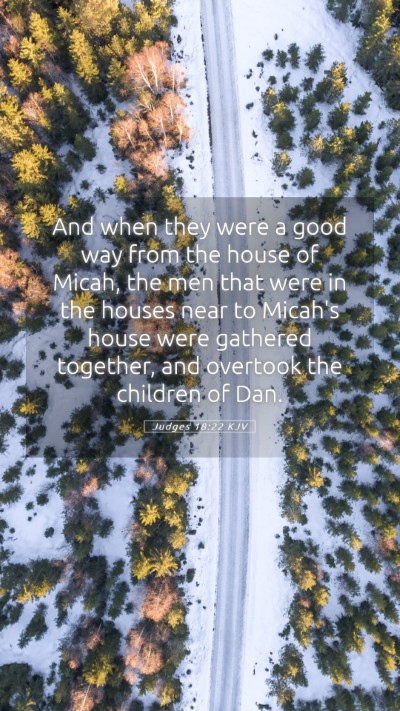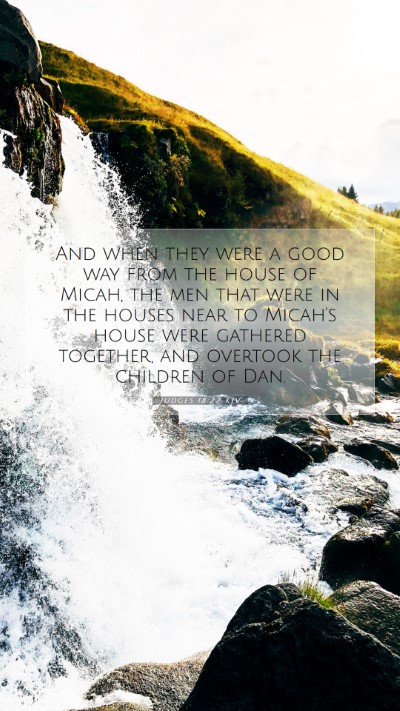Understanding Judges 18:22
The Bible verse Judges 18:22 states:
"When they had gone a distance from the house of Micah, the men who were in the houses near Micah’s house gathered and overtook the children of Dan."
Context and Background
This passage occurs within the narrative of the tribe of Dan, which, as described in the Book of Judges, was struggling to find a secure and prosperous inheritance in the Promised Land. The text illustrates the conflict between the Danites and Micah, who had established a personal shrine.
Judges 18:22 - Verse Meaning
- Micah's Idolatry: Matthew Henry notes that Micah's establishment of personal worship reflects a deviant form of religion that was prevalent during this time. The Danites' pursuit of their own interests, even at the expense of others, highlights the moral decline in Israel.
- Community Conflict: Albert Barnes emphasizes the collective action of Micah's neighbors, suggesting that such gatherings were reflective of societal loyalties that often contradicted divine commandments. The unity of the Danites against Micah illustrates the tension between tribal affiliations.
- Dana and the Search for Inheritance: Adam Clarke provides insights into Dan's plight, shedding light on their need to find a suitable territory. Their search represents a broader theme of seeking fulfillment amidst ambiguity and spiritual confusion.
Insights from Commentaries
When examining the verse through various commentaries, we are reminded of the importance of contextual study in understanding Scripture. Below are several insights drawn from prominent public domain commentaries:
Matthew Henry's Commentary
Henry's reflections convey that within the chaos of personal ambition (Micah’s idolatry) and tribal conflict (the Danites' aggressive actions), we reconsider our attitudes towards worship and community. The act of "overtaking" represents not just physical pursuit, but also the inner spiritual battles faced by those straying from true worship.
Albert Barnes' Notes
Barnes elucidates on the nature of idolatry and how it leads to division within the community. The pursuit of the Danites is consequentially portrayed as a reflection of their internal failings. The passage serves as a profound warning against the prioritization of personal gain over communal righteousness.
Adam Clarke's Commentary
Clarke explores the historical background of the Danites and their geographical struggles, noting that their actions stemmed from desperation rather than divine guidance. This highlights the contrast between divine providence and human agency, leading to chaotic outcomes.
Biblical Exegesis and Analysis
In this verse, the intersection of personal motives and collective actions contributes to our understanding of broader themes in the Scripture, such as:
- **Moral ambiguity** in seeking personal desires
- The **repercussions of idolatry** within communities
- The dynamics of **personal versus communal fidelity** in faith
Application and Reflection
For modern readers, Judges 18:22 serves as a significant lesson on the importance of aligning our pursuits with divine principles. The pursuit of success should not overshadow our community’s well-being or our devotion in worship.
Cross References
- Judges 17:5 - The establishment of Micah's idolatry
- Judges 18:1 - The overall context of Dan's search for land
- Exodus 20:3-4 - God's commandments regarding worship and idols
Conclusion
The analysis of Judges 18:22 provides valuable insights into the struggles of the Israelites and highlights the relevance of understanding Scripture in today’s context. Engaging with this verse encourages deeper reflection on our priorities, community integrity, and fidelity to God’s teachings. As we explore Bible verse meanings and interpretations, may this passage inspire both personal and communal faithfulness.
For those participating in **Bible study groups** or conducting **online Bible study**, the insights gained from Judges 18:22 can aid in rich dialogue and deeper understanding of our spiritual commitments and the consequences of our choices.


